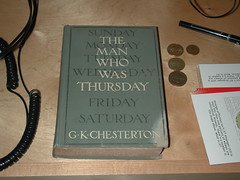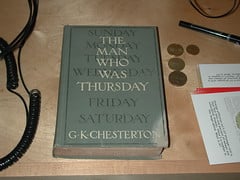To say that I come from a mixed background is an understatement. I was raised in the Independent Christian Church movement, discipled in a rising megachurch run by one of the current promoters of Radical Christianity, and have enjoyed close brushes with Eastern Orthodoxy and most varieties of Anglicanism. I now embrace Reformed theology, but I got my first steps down that road through reading Thomas Aquinas. I spent several years self-identifying as a “generic evangelical”, and somehow I was almost completely unironic about it. I absorbed all of those influences between the ages of fifteen and twenty-five, and I have spent the time since sorting through it all.
Given that background, I could almost be a poster child for evangelical eclecticism. But a funny thing happened along the way.
In The Man Who Was Thursday, Chesterton describes Gabriel Syme’s pedigree in this way:
Being surrounded with every conceivable kind of revolt from infancy, Gabriel had to revolt into something, so he revolted into the only thing left—sanity.
Exposed to wildly varied theological influences in my late youth and early adulthood, I find myself likewise revolting into particularity. I was once proudly inclined to pick and choose the “best” parts of thinkers across centuries and competing schools of thought—and proudly called myself humble for it.
I once somewhat admired the notion of heeding the Calvinists on election, the Arminians on free will, Catholic mystics on spirituality, and certain Charismatics on the Spirit. I am now more inclined to see that as the route of universal condescension. Drilling down into one particular tradition, its predecessors and its context, as a more humbling discipline.
Login to read more
Sign in or create a free account to access Subscriber-only content.

